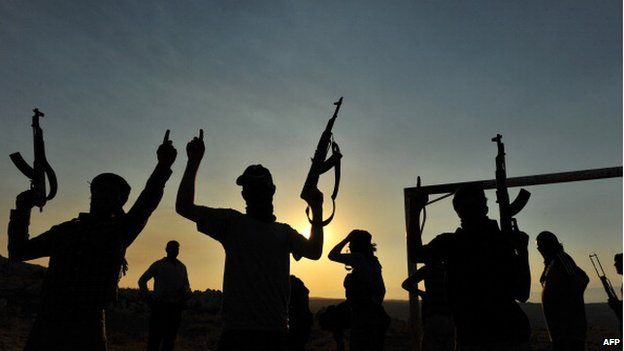Tackling Australia's home-grown jihadists
- Published

Australian jihadists fighting for radical Islamist groups in Iraq and Syria are to be targeted by new laws, amid fears they pose a growing threat at home.
The legislation would make it easier for the police to detain and prosecute suspected extremists and force Australians to justify their travel to areas of conflict abroad.
"The potential for terrorism in this country has substantially increased," warned Prime Minister Tony Abbott.
"We've all seen truly shocking imagery of Australians born and bred doing absolutely horrific things to surrendering Iraqi police and military personnel."
"What we are now acutely conscious of is the danger posed back here in Australia by people returning to this country who have been radicalised and militarised by the experience of working with terrorist organisations overseas."
Last month, authorities in Canberra said they had issued arrest warrants for two Australian Islamic State fighters, after one was pictured brandishing the severed heads of what appeared to be Syrian government soldiers.
Investigators have identified the two suspects as Khaled Sharrouf and Mohamed Elomar, who was shown in photographs posted on social media clutching the bloody remains of his enemies, and boasting that he would cut the throats of infidels.
The pair from Sydney are alleged to be two of the most notorious Australians fighting with the Islamic State in Syria and Iraq.
'We are the sane'
Sharrouf has form. He was one of eight people arrested for plotting to attack the Lucas Heights nuclear reactor in Sydney, and, after pleading guilty, was jailed in 2008, serving almost four years in prison.
In December, he slipped out of the country using his brother's passport, and has issued a call-to-arms for his fellow Muslims in Australia.
He has taunted the police, and recently sent a provocative note to Australia's Fairfax media from Iraq.
"We will dedicate our lives to your unrest," he wrote. "We are not mad men or dysfunctional as they portray us to be."
"By Allah, we are the sane. Anyone who sees what is happening to the Muslims around the world... and sits back and does nothing, he is insane."
Senior intelligence officials in Canberra also fear the conflicts in Syria and Iraq could revive the anti-Western extremism in Indonesia that led to the attacks in Bali in 2002, which killed 88 Australians. The bombings were blamed on the militant organisation, Jemaah Islamiah (JI).
Officials estimate that there are between 150 to 160 Australians currently fighting with radical Islamist groups overseas, considerably more than those who travelled to join the war in Afghanistan.
"It's about as big a threat as we've ever faced," explained Professor Greg Barton, the director of the International Global Terrorism Centre at Monash University in Melbourne.
"It was returning fighters from Afghanistan to South-East Asia that formed the JI network. And if we follow the pattern of what happened with Afghanistan, they'll return home and find it hard to give up fighting."
"They'll have been traumatised and radicalised to a fairly horrible degree. We may see the likes of Bali 2002 repeated. I think it's almost inevitable we're going to see more lives lost from jihadi violence in South East Asia."
Australia has run deradicalisation programmes to try to divert at-risk young Muslims away from trouble.
Academic studies have shown that more than half of those who have embraced radicalism were born in Australia and about 60% are of Lebanese heritage.
Most were married with children, and weren't particularly religious prior to being seduced by extreme Islamic ideologies.
A fundamental driver, according to the research at the University of Western Sydney, has been the stigmatisation of Muslims within Australia and beyond.
'Not hit the mark'
Kuranda Seyit, the executive director of the Forum on Australia Islamic Relations, believes Canberra's efforts at deradicalisation have not worked.
"The government's attempts have not hit the mark," he told the BBC news website. "They have been cosmetic and have been addressing the wrong crowd, mainly moderate Muslims."
Targeting fringe groups is difficult. They are invariably small and close-knit, and are unmoved by the urgings of mainstream Imams and preachers.
"The onus (of deradicalisation projects) is on various community agencies and non-governmental organisations to address the problem but they don't have the capacity, skills or the knowledge to deal with the issue. Access to those groups who are at most at risk of radicalisation is the key problem here," Seyit added.
Australia intends to address the threat of homegrown extremism by boosting funding to security agencies over the next four years by A$630 million ($580m, £348m).
In a rare public appearance last month, the director-general of the Australian Security Intelligence Organisation, David Irvine, said the nation must always be vigilant.
"We've always been worried about the threat of home-grown terrorism," he told the Australian Broadcasting Corporation.
"In the last 10 years we have actually stopped four mass casualty attacks occurring in Australia, when we stopped them quite early in their planning stages."
The new security measures will be included in the Terrorism Foreign Fighter Bill, which is expected to come before parliament in Canberra later this month.
- Published5 August 2014
- Published21 July 2014
- Published20 June 2014
- Published14 November 2005